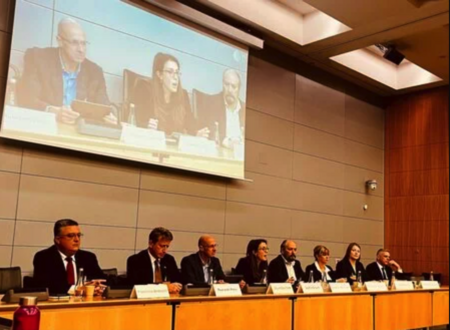29 February 2024

Leather Working Group was pleased to both attend and contribute to the recent OECD Forum on due diligence in the garment and footwear sector. Read Director of Sustainability, Christina Trautmann’s summary and insights from the two days and watch the session on deforestation risks associated with the leather supply chain.
Day one
Day one of the OECD forum on due diligence in the garment and footwear sector was inspiring. These are some of the key take aways:
- Fashion is becoming a regulated industry
- Binding, mandatory frameworks create a level playing field where everyone has to work towards the same goal and meet minimum standards
- Collective action helps to provide the leverage needed to affect change
- Investment is preferred and encouraged over divestment, as you lose your leverage to influence change once you step away
- Transparency is an essential enabling factor in due diligence
- Standardised approaches provide the necessary clarity and consistency across different asks
- We need to look beyond auditing to ensure we're driving meaningful change
- Voluntary agreements need to have teeth
Day two
An interesting session on the role of certifications in due diligence provided varied perspectives on auditing and certification. The overall message was that there is a role for audits and certification to support due diligence, but there are several activities that the company responsible needs to carry out themselves. Roles and responsibilities between different actors need to be better understood and, a balance needs to be found between national laws and adequate enforcement of those laws; established relationship between a brand and their suppliers; and certifications with a robust assurance process.
Very relevant for leather, deforestation risks associated with leather production were also discussed, with Leather Working Group taking part in the final session of the day, deforestation risks associated with the leather supply chain.
The scene was set well, with a clear explanation of the roles and drivers – cattle rearing is associated with deforestation due to its role in land use change and its transition for agricultural purposes, while leather is a by-product of the meat industry and is even further removed from this. As such, many challenges exist in meeting DCF aims or enabling companies to comply with the EU Deforestation Regulation.
These were the key takeaways:
- There needs to be a focus on communication and helping to improve the understanding of all actors in the value chain
- There is an opportunity for collaboration and working together to have greater leverage and share learnings
- There remains a question over who will pay for the traceability and due diligence required, with the need to not lose sight of the purpose behind this effort to stop deforestation
The session is available to watch, (requires registration) on the OECD website here.

